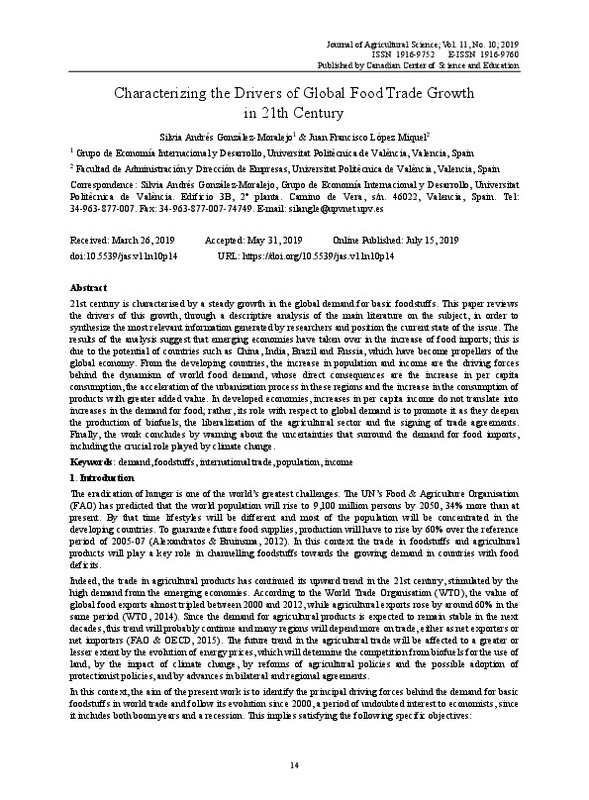JavaScript is disabled for your browser. Some features of this site may not work without it.
Buscar en RiuNet
Listar
Mi cuenta
Estadísticas
Ayuda RiuNet
Admin. UPV
Characterizing the Drivers of Global Food Trade Growth in 21th Century
Mostrar el registro sencillo del ítem
Ficheros en el ítem
| dc.contributor.author | Andrés González-Moralejo, Silvia
|
es_ES |
| dc.contributor.author | López-Miquel, Juan Francisco
|
es_ES |
| dc.date.accessioned | 2020-11-18T04:31:22Z | |
| dc.date.available | 2020-11-18T04:31:22Z | |
| dc.date.issued | 2019-07-15 | es_ES |
| dc.identifier.issn | 0021-8596 | es_ES |
| dc.identifier.uri | http://hdl.handle.net/10251/155236 | |
| dc.description.abstract | [EN] 21st century is characterised by a steady growth in the global demand for basic foodstuffs. This paper reviews the drivers of this growth, through a descriptive analysis of the main literature on the subject, in order to synthesize the most relevant information generated by researchers and position the current state of the issue. The results of the analysis suggest that emerging economies have taken over in the increase of food imports; this is due to the potential of countries such as China, India, Brazil and Russia, which have become propellers of the global economy. From the developing countries, the increase in population and income are the driving forces behind the dynamism of world food demand, whose direct consequences are the increase in per capita consumption, the acceleration of the urbanization process in these regions and the increase in the consumption of products with greater added value. In developed economies, increases in per capita income do not translate into increases in the demand for food; rather, its role with respect to global demand is to promote it as they deepen the production of biofuels, the liberalization of the agricultural sector and the signing of trade agreements. Finally, the work concludes by warning about the uncertainties that surround the demand for food imports, including the crucial role played by climate change. | es_ES |
| dc.language | Inglés | es_ES |
| dc.publisher | Cambridge University Press | es_ES |
| dc.relation.ispartof | Journal of Agricultural Science | es_ES |
| dc.rights | Reconocimiento (by) | es_ES |
| dc.subject | Demand | es_ES |
| dc.subject | Foodstuffs | es_ES |
| dc.subject | International trade | es_ES |
| dc.subject | Population | es_ES |
| dc.subject | Income | es_ES |
| dc.subject.classification | ECONOMIA, SOCIOLOGIA Y POLITICA AGRARIA | es_ES |
| dc.title | Characterizing the Drivers of Global Food Trade Growth in 21th Century | es_ES |
| dc.type | Artículo | es_ES |
| dc.identifier.doi | 10.5539/jas.v11n10p14 | es_ES |
| dc.rights.accessRights | Abierto | es_ES |
| dc.contributor.affiliation | Universitat Politècnica de València. Departamento de Economía y Ciencias Sociales - Departament d'Economia i Ciències Socials | es_ES |
| dc.description.bibliographicCitation | Andrés González-Moralejo, S.; López-Miquel, JF. (2019). Characterizing the Drivers of Global Food Trade Growth in 21th Century. Journal of Agricultural Science. 11(10):14-28. https://doi.org/10.5539/jas.v11n10p14 | es_ES |
| dc.description.accrualMethod | S | es_ES |
| dc.relation.publisherversion | https://doi.org/10.5539/jas.v11n10p14 | es_ES |
| dc.description.upvformatpinicio | 14 | es_ES |
| dc.description.upvformatpfin | 28 | es_ES |
| dc.type.version | info:eu-repo/semantics/publishedVersion | es_ES |
| dc.description.volume | 11 | es_ES |
| dc.description.issue | 10 | es_ES |
| dc.relation.pasarela | S\407682 | es_ES |








